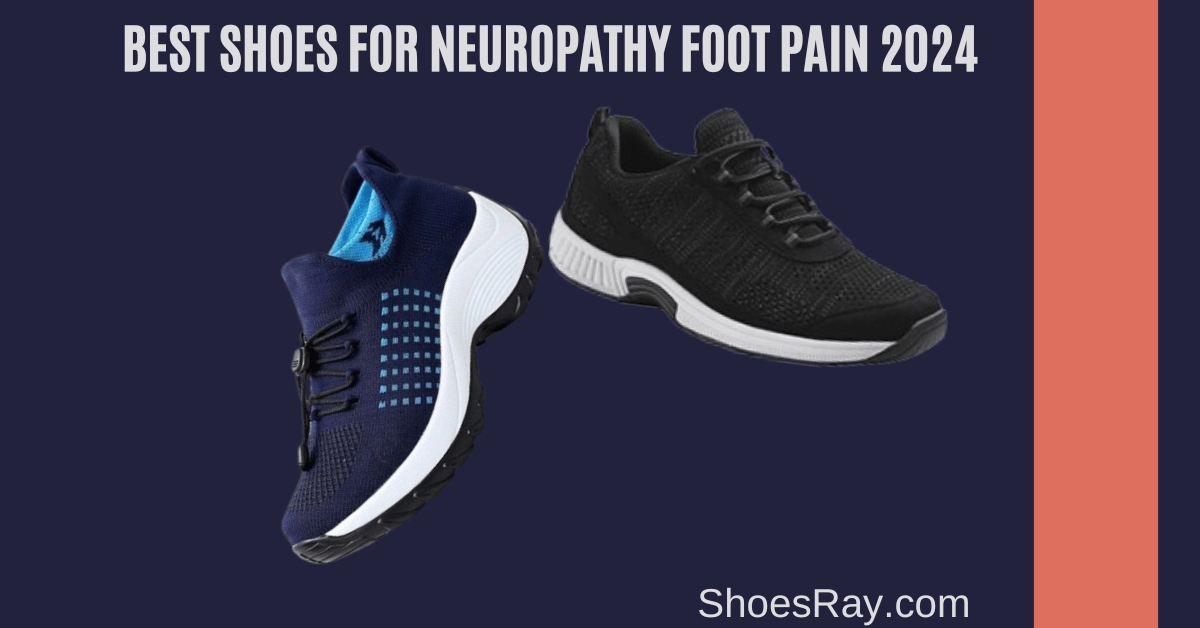The best neuropathy shoes provides ultimate comfort and protection for neuropathy sufferers. Neuropathy shoes have a soft fabric interior and padding with anti-friction foam to provide exceptional comfort and protection for peripheral neuropathy and diabetic neuropathy.
The elastic upper of these shoes for neuropathy follows the contours of the foot, relieves pressure points and improves comfort.
Premium orthotic insoles with anatomical arch support help control overpronation and reduce pressure on the arch of the foot.
The wide toe box and extra depth design provide diabetic neuropathy shoes with a comfortable fit and additional room for toe movement.
The ergonomic sole of Orthofeet shoes for people with diabetic neuropathy provides excellent cushioning and stability.
Best Shoes for Neuropathy Foot Pain in 2024
1. Orthofet Verve Tyrese
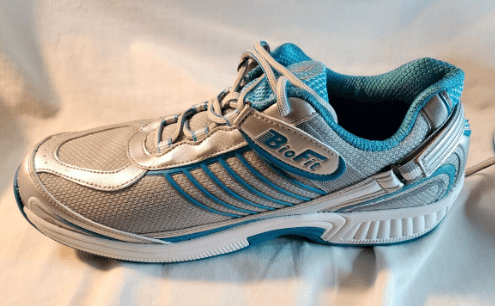
Sneakers are one of the best shoes for foot pain in that they support the wearer, provide strong traction, and provide flexibility. However, these same styles typically feature laces that are difficult for people with neuropathy in their hands and feet to tie. Luckily, Orthofeet has a clever solution with their Verve Tie-Less Athletic shoes.
Although they have laces for cosmetic purposes, these shoes have a simple pull system to tie the laces and an adjustable heel strap at the back, making them ideal for people with neuropathy. Velcro tabs on the inside and outside of the shoe allow users to “tighten” the laces from the top using the familiar Velcro method.
For anyone who often has swollen feet or has trouble sliding their feet out of their shoes, this adjustment can be of great help and make the entire process easier. Additionally, these shoes are approved by the American Podiatric Medical Association (APMA) to support overall foot health, so you can wear them with confidence that they will keep you going pain-free.
Although sized for women, the men’s Monterey style is basically the same.
2. New Balance 928: New Balance shoes for peripheral neuropathy
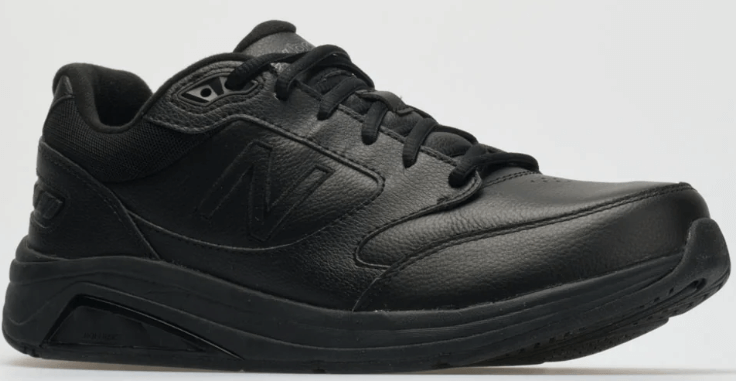
The New Balance 928 is an athletic shoe designed specifically for individuals with neuropathy, a condition that affects the nerves and can cause numbness, pain, and tingling in the feet. These shoes are designed to provide comfort, support, and stability to people with neuropathy, making it easier for them to walk and perform daily activities.
The shoes have a wide toe box, giving your toes plenty of room to move and reducing pressure on your feet. Soft, breathable upper material provides a comfortable fit and keeps your feet cool and dry, reducing the risk of blisters and discomfort. The cushioned insole provides excellent arch support, reducing pressure on the foot and providing a more comfortable walking experience.
The shoes also have sturdy soles that provide excellent traction, reducing the risk of falls. The sole is made of durable rubber material and provides good grip on a variety of surfaces, making it ideal for walking on uneven terrain. The shoes also feature a supportive heel counter that stabilizes the foot and provides additional support while walking.
The New Balance 928 is designed to provide a comfortable fit for people with neuropathy and features a wide toe box, soft upper material, and a cushioned insole.
The shoe’s cushioned insole provides excellent arch support, reducing pressure on the feet and providing a more comfortable walking experience.
The shoe’s sturdy sole provides excellent traction, reducing the risk of falls and injuries.
Overall, New Balance shoes for peripheral neuropathy, the New Balance 928 is a supportive and comfortable sneaker designed specifically for people with neuropathy. It offers a comfortable fit, excellent arch support, and a sturdy sole that reduces the risk of falls.
3. Hush Puppy sneakers
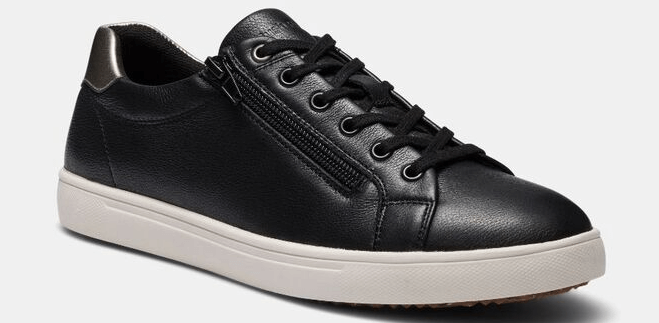
Hush Puppies sneakers are designed specifically for people with neuropathy. The soft, breathable upper is easy to put on and take off, making it ideal for those who have trouble tying laces or bending over to tie their shoes. The shoe’s cushioned insole provides excellent arch support, which reduces pressure on the foot and helps relieve discomfort associated with neuropathy. Additionally, the shoe’s sturdy sole provides excellent traction, reducing the risk of falls and injuries.
Hush Puppies are designed to provide a comfortable fit for individuals with neuropathy, with a soft, breathable upper and a cushioned insole to support the arches.
The slip-on design of the shoes makes them easy to put on and take off. This is ideal for people who have trouble tying laces or bending over to tie their shoes.
4. Skechers Ultra Flex 3.0 Slip-ins
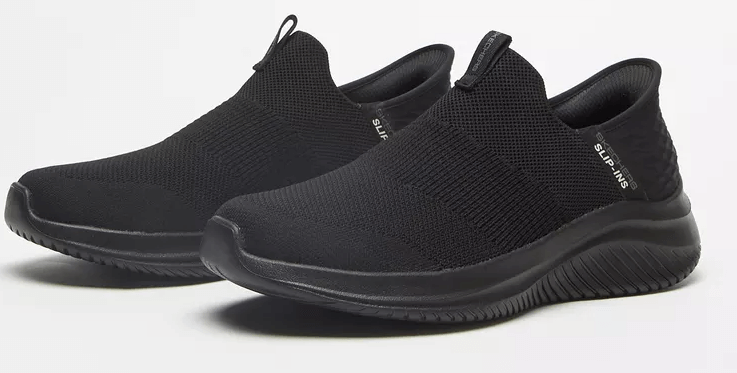
This is ideal for people who have balance issues due to neuropathy, people who also have neuropathy in their hands, and anyone who wants to get out the door faster. (If you like the hands-free concept described here, be sure to check out our list of other great hands-free shoes.)
One of the best features of these shoes is their flexible outer material, which provides a sock-like comfort. This may be an ideal setup for those with occasional swelling or those looking for a non-rubbing, non-chafing material. However, if you plan to frequently hit hard surfaces or be in crowded spaces, shoes with a more protected toe box may be ideal.
Memory foam cushioned insole is comfortable and hugs the heel. Stretch fit design allows for more space utilization
5. Black Hoka Clifton 9 sneakers
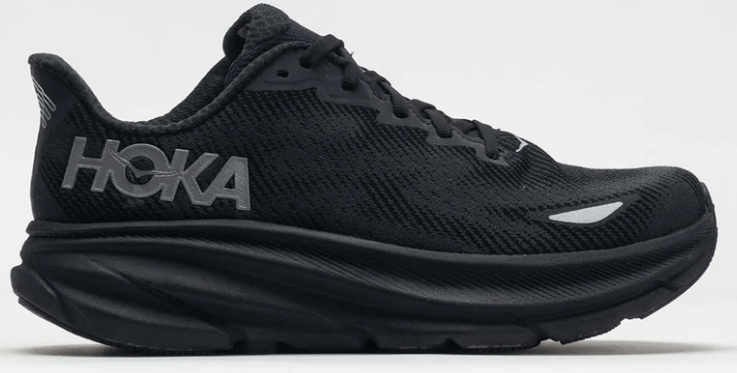
The Hoka Clifton 9 is a modern classic with a lightweight feel and carefully crafted construction. Hoka shoes have become the most popular footwear among medical professionals.
For those who prefer a more classic sneaker and don’t struggle with laces, Hoka’s Clifton 9 sneakers are a great choice.
One of its greatest features is its lightweight construction. It weighs only 7.3 ounces. For people like me who can’t quite picture the weight in their head, it’s about the same as a cup of sugar or an adult hamster. If heavier, clunkier shoes make you more likely to fall, these are great shoes that make you feel like you’re wearing nothing at all.
Additionally, the Clifton 9’s non-slip rubber outsole is shaped to be inherently stable, helping you maintain balance even when neuropathy makes balance more difficult. Although they don’t offer the advanced orthotics of some of the other products on this list, if adaptations like additional arch support cause more pain than they save, they are a great neutral option that supports good foot health without the extra bells and whistles.
The shoes linked below are in women’s sizes, but you can also buy a men’s version of the Clifton 9.
6. Brooks Addiction Walker
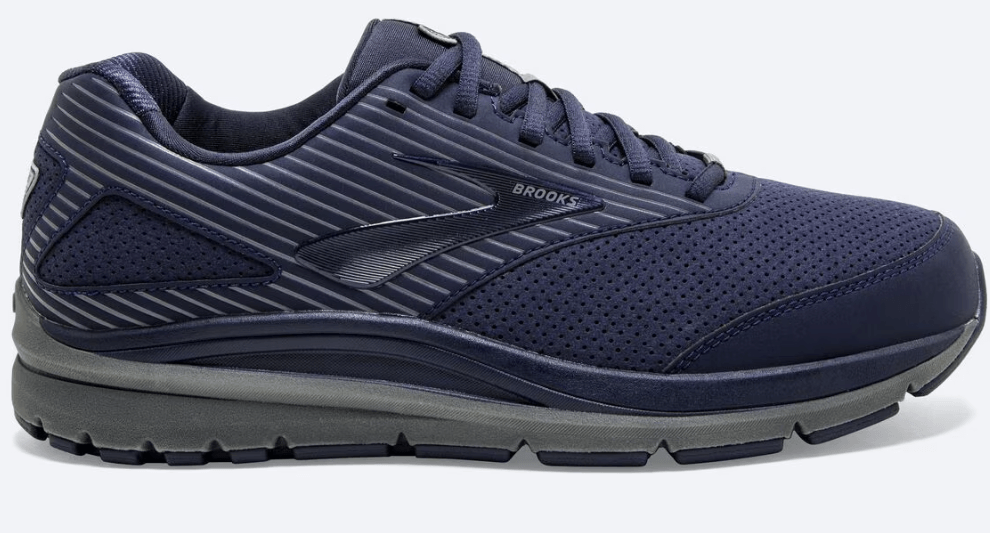
The Brooks Addiction Walker is a running shoe designed specifically for people with neuropathy. Features a roomy toe box, soft, breathable upper, and cushioned insole for excellent arch support. The shoe’s roomy toe box provides a comfortable fit and helps prevent blisters and pressure points. The soft, breathable upper material feels comfortable against the skin and allows airflow to keep your feet cool and dry. Cushioned insoles provide excellent arch support, reducing pressure on the feet and alleviating discomfort associated with neuropathy. Additionally, the shoe’s sturdy sole provides excellent traction, reducing the risk of falls and injuries.
Brooks Addiction Walker’s cushioned insoles provide exceptional arch support, helping reduce pressure on the feet and relieve discomfort associated with neuropathy. The shoe’s wide toe box and soft, breathable upper material provide a comfortable fit for people with neuropathy.
Overall, the Brooks Addiction Walker is a great choice for neuropathy sufferers looking for a comfortable, supportive running shoe. However, it may not be suitable for individuals with severe neuropathy or very high arches who require more specialized support.
7. On Cloud 5
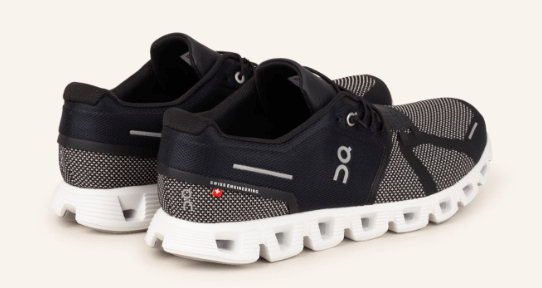
Made with breathable mesh and 44% recycled material, On Running’s popular sneakers feature “shock absorption and cushioning to increase comfort” and are designed to “reduce the energy required for forward motion,” says Anne Sharkey, a podiatrist at North. says D.P.M. Austin Foot and Ankle Institute. These features make them a comfortable shoe for walking as well as everyday activities like running errands or shopping.
8. WalkRide FlyteFoam
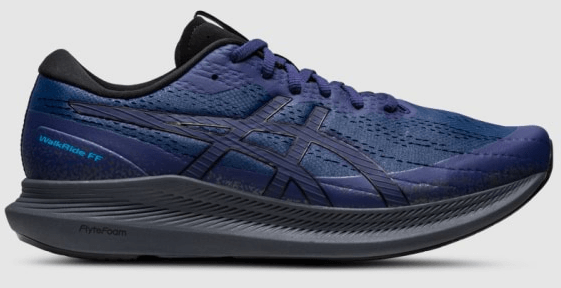
Sharkey recommends this pair from Asics for its lightweight cushioning, calling it “a comfortable shoe that will leave you cushioned with every step.” Along with shock-absorbing Flytefoam cushioning in the midsole, these sneakers are designed with synthetic leather overlays and breathable mesh underlays. “The breathable material of the upper makes it perfect for anyone with warm, sweaty feet,” added Sharkey.
Features of shoes for neuropathy
Neuropathy shoes are specifically designed to address the unique needs of individuals with neuropathy. These shoes offer a variety of features to promote optimal foot health, reduce pain, and improve overall comfort. Let’s take a look at some of the key features to consider when choosing men’s neuropathy shoes.
Additional Depth and Width: Neuropathy often causes foot deformity and swelling. Neuropathy shoes therefore need to provide additional depth and width to accommodate these changes and prevent unnecessary pressure on sensitive areas of the foot. This feature ensures a better fit and minimizes the risk of developing blisters or ulcers. KURU shoes feature a wide toe box and are available in several styles in generous widths to help give your feet the room they need.
Soft, non-irritating materials: For people with neuropathy, it is essential to choose shoes made of soft, non-irritating materials. These materials help prevent potential skin injuries by reducing friction and irritation. Look for shoes made of breathable fabric or soft leather to enhance comfort and protect your feet.
Sufficient cushioning and support: Neuropathy shoes should have excellent cushioning and support to absorb shock and provide stability while walking or standing. Look for shoes with advanced cushioning technologies, such as gel inserts or memory foam, to relieve pressure on your feet and improve overall comfort.
Arch Support and Stability: Proper arch support is very important for individuals with neuropathy as it helps maintain the natural alignment of the foot and reduces strain on the foot and ankle. Look for shoes with built-in arch support and stability features to promote optimal foot biomechanics.
Adjustable closures: Shoes with adjustable closures, such as Velcro straps or laces, are ideal for individuals with neuropathy. These closures allow for easy adjustments and accommodate swelling or changes in foot size throughout the day. It also provides a secure fit and minimizes the risk of tripping or falling.
Frequently Asked Questions
Why do I need shoes for neuropathy?
Neuropathy is a condition that affects the nerves, often causing numbness, tingling, and pain, especially in the extremities, such as the feet. People with neuropathy may benefit from wearing Propét neuropathy shoes for the following reasons:
Pressure distribution: Neuropathy can cause changes in pressure distribution in the foot, leading to areas of increased pressure that can lead to calluses or ulcers. Properly designed shoes help reduce the risk of these complications by distributing pressure more evenly.
Protection from injury: Neuropathy can reduce your ability to feel sensation in your feet, making you more vulnerable to injury. Shoes designed for neuropathy often have additional padding and protection to reduce the risk of cuts, bruises, and other injuries.
Control for foot deformities: Neuropathy can sometimes lead to foot deformities, such as changes in the arch of the foot. Special shoes are designed to accommodate this deformity, providing a better fit and reducing discomfort.
Reduced friction: Neuropathy can cause skin to dry out and lack natural lubrication, increasing the risk of friction-related injuries. Shoes with smooth interiors and moisture-wicking properties help reduce friction and prevent skin problems.
Stability and traction: Neuropathy affects balance and coordination, making an individual more prone to falls. Shoes with good stability and traction help prevent slips and falls.
Cushioning and Support: Shoes for neuropathy typically feature additional cushioning and support to provide comfort and reduce impact on the foot. This is especially important for individuals who have decreased sensation and are less aware of foot position and movement.
What shoes do you wear when you have neuropathy?
When choosing shoes for neuropathy, consider the following features:
A wide toe box that allows the toes to spread naturally reduces pressure and friction on the nerves, providing comfort and minimizing the risk of foot ulcers or other complications.
Good cushioning helps absorb shock and reduce pressure on the foot, which can relieve pain and discomfort associated with neuropathy.
Adequate arch support and stability features can help maintain proper foot alignment and reduce strain on the nerves. A sturdy midsole and supportive heel counter provide stability and support.
Breathable material regulates foot temperature and prevents excessive moisture build-up, which can increase the risk of fungal infections.
Adjustable closures such as laces, straps or Velcro allow for a customized and secure fit. This is especially important if you have a foot deformity or are concerned about swelling.
The smooth, smooth interior minimizes friction and irritation on your feet, reducing the risk of blisters or inflammation.
Is it better to wear shoes if you have neuropathy?
Wearing shoes helps prevent injuries from sharp objects, uneven surfaces, and accidental impacts, especially if neuropathy causes decreased sensation or numbness. Shoes with adequate support and cushioning help relieve pressure on your feet and reduce the impact you receive when walking or standing. Shoes can also provide stability and improve balance, which may be helpful if you have balance problems related to neuropathy. Finally, wearing properly fitting shoes with a wide toe box that accommodates the specific foot condition or deformity associated with neuropathy can help reduce friction, pressure points, and other sources of discomfort.
Is walking bad for foot neuropathy?
Walking can have both benefits and potential challenges for individuals with foot neuropathy. It is important to wear appropriate shoes with cushioning, support, and proper fit. Additionally, it is important to maintain foot health by regularly examining your feet for signs of injury or changes and promptly addressing any concerns with your health care professional. The benefit of walking is that it promotes blood flow to the feet, which can improve circulation and potentially relieve symptoms associated with neuropathy. Walking can also stimulate the nerves in your feet, which can help maintain function and potentially improve sensation. Lastly, walking is a low-impact aerobic exercise that improves cardiovascular health, strengthens muscles, and helps with weight management. These benefits can have a positive impact on your overall well-being, including foot health.
What are the best shoes to wear when you have neuropathy?
When it comes to the best type of shoe for neuropathy, experts generally recommend sneakers or sports shoes suitable for walking. Walking shoes are a perfect combination of functionality and comfort. It is constructed to provide stability throughout the gait cycle, explains Sharkey.
No matter what type of shoe you buy, it’s important to look for good cushioning, shock absorption, and a wide toe box. You can also add orthotic shoe inserts to further improve your foot pain.
Sometimes the best option is to combine a cushioned shoe with a wide toe box with an adjustable insert that evenly distributes pressure.

